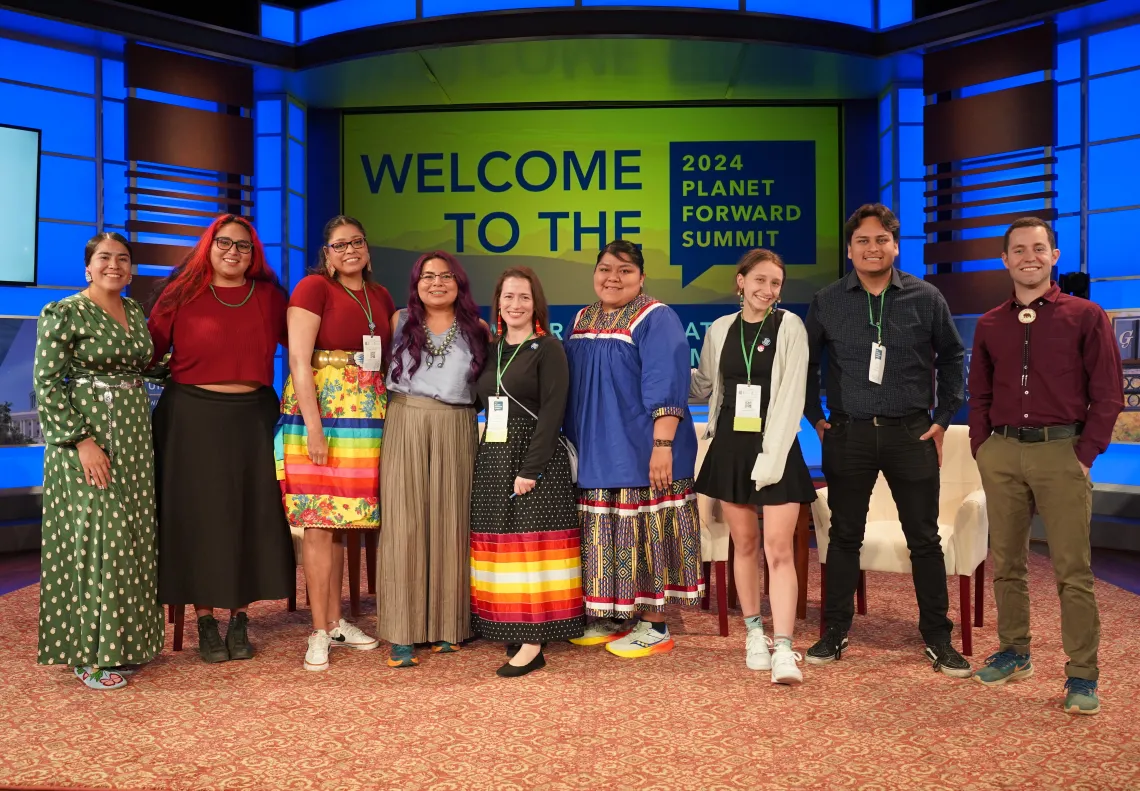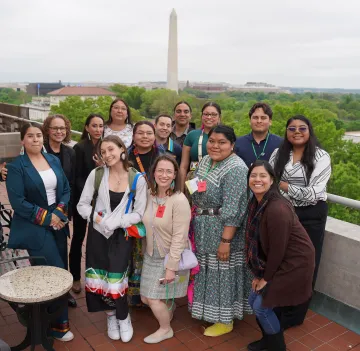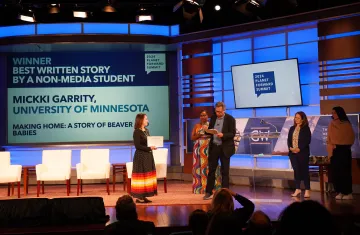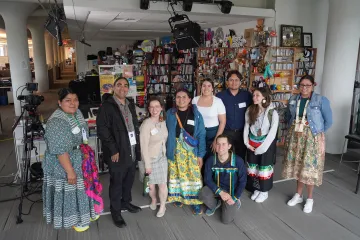Indigenous Correspondents at the Planet Forward Summit in Washington, DC.
The Ilíiaitchik: Indigenous Correspondents Program take on Washington DC!

Members of the Indigenous Correspondents (ICP) Program at the Planet Forward Summit at George Washington University in Washington DC.

ICP is extremely grateful for the opportunity to meet with leaders at the Department of Interior. The team posed for this photo on the balcony outside of Deb Haaland’s office.
The Indigenous Correspondents Program (ICP) and the Indigenous Resilience Center (IRes) had the opportunity to attend the Planet Forward Summit at the George Washington University in Washington DC. Planet Forward is an environmental storytelling initiative of the George Washington University School of Media and Public Affairs and is collaborating with the University of Arizona’s AIR Education Initiatives and the Indigenous Resilience Center, as well as the Native FEWS Alliance, to support greater participation by Indigenous students in a program that centers their voices and brings broader perspectives to the successful Planet Forward platform. At the Planet Forward Summit in Washington DC, they engaged in workshops led by global environmental leaders and met with their cohort.
The Ilíiaitchik: Indigenous Correspondents Program supports 10-12 Indigenous graduate and upper-division undergraduate students from across the United States through a 10-month communication skill-building, professional development, and community-building program led by Indigenous mentors in fields ranging from environmental journalism to podcast production.
The program was founded by Alexander Cotnoir and JoRee LaFrance. Alexander is a citizen of the Nulhegan Band of the Coosuk Abenaki Nation. His passion for environmental education is rooted in his home in Askaskwiwajoak (the Green Mountains of Vermont).The program’s co-founder, JoRee LaFrance, comes from the Apsáalooke/Crow Nation and selected the word Ilíiaitchik (Phonetic spelling: "Ih-lia-it-chick") from her language that encompasses the program’s goal to amplify voices bringing about positive change. Students with an interest in environmental science and knowledge generation, resilient solutions, and effective storytelling in media spaces are encouraged to apply to participate in the Indigenous Correspondents Program. Program applications are open each April - June.
The Correspondents in DC:
Abigail Burgess (she/they) is a member of the Eskasoni Band of the Mi’kmaq First Nations community in Cape Breton, Nova Scotia. She is a junior at Dartmouth College, studying Native American and Indigenous Studies and Psychology. At Dartmouth, she currently serves as Social Coordinator on the Native Americans at Dartmouth Executive Board, organizing events for the Indigenous community on campus. Through the Indigenous Correspondents Program, Abigail aims to capture the historical and modern manifestations of her community’s term Netukulimk. Netukulimk navigates the Mi’kmaq peoples’ relationship with msit no’kmaq - all our relations, or our emotional, social, and spiritual relationship with the physical land, human beings, nature, and everything belonging to Wskitqamu (Mother Earth). Netukulimk incorporates the spirit, mind, heart, and body in relation to levels of interconnectedness: self, family, community, and environment. Through her work, Abigail seeks to investigate this complicated relationship of the revitalization of cultural concepts in a post-colonial era, especially Netukulimk.
Link to story: https://planetforward.org/story/indigenous-moose-harvesting/
Eric Trujillo (he/him) is an enrolled member of the Eastern Shoshone Tribe of Wyoming and is a senior majoring in Journalism and minoring in Spanish at the University of Arizona. Growing up, he would visit his grandparents and family on the Wind River Indian Reservation every summer between school years. Through the Indigenous Correspondents Program, Eric wants to grow as a journalist, storyteller, and make the most of the opportunity given to him. With the help of the program, he hopes to be able to better help those around him through storytelling and knowledge.
Link to story: https://planetforward.org/story/indigenous-mindset-agriculture/
Emiliano McLane is Newe, comes from the Tosawihi clan of the Te-Moak Tribe of Western Shoshone and was raised on the South Fork Indian Reservation near Lee, Nevada. As a descendant of the Pomo, Wailaki, and Nomlaki tribes, he also spent time on his father’s Reservation known as Round Valley near Covelo, California. Emiliano received his Bachelor of Science degree in Agricultural Science, Communication, and Leadership from the University of Idaho College of Agricultural and Life Sciences. Currently, he is a second-year graduate student pursuing his degree in Agricultural and Extension Education. Through the Indigenous Correspondents Program, Emiliano intends to bring cultural stories to life through technology so that they may be brought into the classroom and homes of tribal youth members to pique their interest in how our cultural stories and practices resonate throughout all time. He is excited to participate in the program to gain a wealth of hands-on knowledge that he will use during his graduate program and future career.
Link to story: https://planetforward.org/story/indigenous-knowledge-photovoltaics/
Mickki Garrity (Potawatomi) is an impassioned advocate for environmental healing, cultural sovereignty, and Native science. Enrolled in the Citizen Potawatomi Nation, Mickki recently relocated to Minnesota from the West Coast. Her academic journey began with a degree in Native Environmental Science from Northwest Indian College, and this fall Garrity will begin graduate studies at the University of Minnesota, where she will research the ecocultural relationships between cultural keystone species of significance to the Nishnabek people, such as beaver and wild rice.
Link to story: https://planetforward.org/story/story-beavers-babies/
Mickki’s story won the best written story by a non-media student at the 2024 Planet Forward Summit.
The judges from Planet Forward said,
“Mickki Garrity has written a compelling story about our relationship with the natural world and with each other. She begins by sharing a creation story of the Nishnabek people, the story of the first man and his first teacher, the beaver. She describes how the beaver lives in the world and how we can learn from the beaver’s example.”
Nizhoni Tallas is a proud member of the Navajo Nation and grew up in Rough Rock, Arizona. After high school she attended Virginia Polytechnic Institute and State University and graduated with her B.S. in natural resources with an emphasis on outdoor recreation management. She recently graduated with her master’s in natural resources and is now in a Ph.D. program at the University of Arizona. Her master’s work focused on understanding interpretative signage throughout parks, national monuments and recreational areas in the Southwest region. She analyzed language usage in interpretive signage to see how these various outdoor locations were sharing Indigenous histories and stories. She looks forward to sharing authentic and compelling stories with others and developing her skills in storytelling. She is excited to engage and learn from other cohort members, instructors, and speakers throughout the program.
Link to story: https://planetforward.org/story/pinon-season/
Shannon Taylor is White Mountain Apache & Navajo, resides on the ancestral lands of her mother’s people, Dził’łigai Sí’áń Ndee (White Mountain Apache), in northeastern Arizona. She is a first generation and non-traditional student in her family. Shannon is currently a Junior pursuing her Bachelors of Science degree in Geographic Information Systems Technology (GIST) and Minor in Environmental Science from the University of Arizona (UA). Through the Indigenous Correspondents Program, Shannon hopes to highlight the importance of TEK in western science. She believes that becoming a steward of the land will ensure that the traditional stories, knowledge, practices, ceremonies and language of Indigenous peoples will live on.
Link to story coming soon!
Kimberlee Blevins Kimberlee is an enrolled member of the Mandan Hidatsa Arikara Nation from the Fort Berthold Indian Reservation; born to the Ciicga Clan, and a descendent of the Hunkpapa Lakota. Her traditional name is Sunlight Woman, given by her great-grandmother, Rose Crow Flies High. Kimberlee’s most cherished roles are being a mother, a daughter, and a student. She is pursuing her Master’s in Environmental Science at Sitting Bull College in North Dakota with a focus on atmospheric science. Her academic path includes a bachelor’s degree in environmental science and research, and two associate degrees in Pre-Engineering and Native American Leadership from United Tribes Technical College.
Link to story: https://planetforward.org/story/braiding-stem/

ICP member, Mickki Garrity, won for Best Written Story by a Non-Media Student. Mickki will receive a free trip to the Galapagos Islands. Read her story here: https://resilience.arizona.edu/news/making-home-story-beaver-and-babies

Along with participating in the Planet Forward Summit, ICP went on tours around Washington DC. During a behind the scenes tour of NPR, member of ICP, AIR, and IRes got to see the famed “tiny desk” from the Tiny Desk Concert series.
